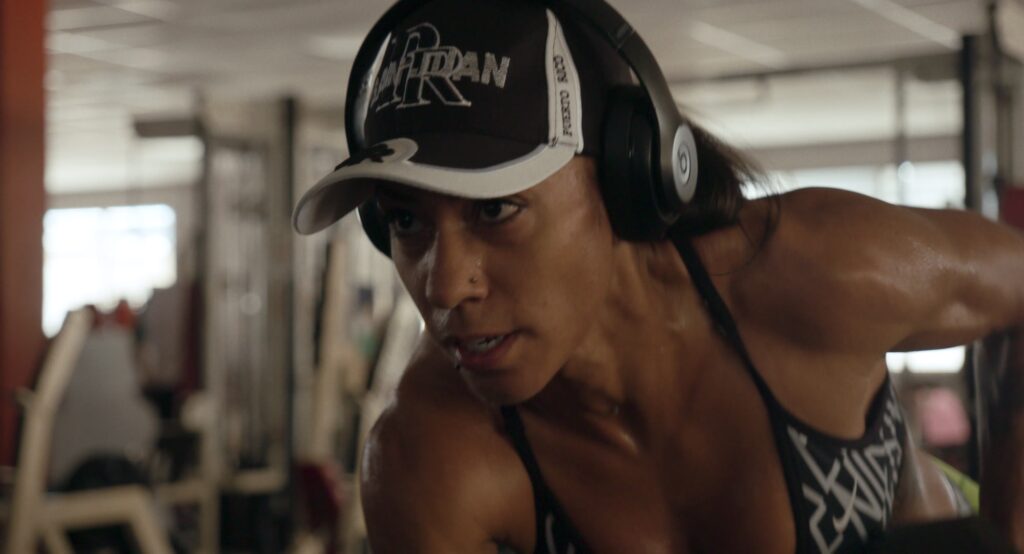Maris Curran’s films have shown at Berlinale, Toronto International Film Festival, the Museum of Modern Art, the NY Times Op-Docs, and PBS’ “Independent Lens.” Her debut narrative feature, “Five Nights in Maine,” starring David Oyelowo, Dianne Wiest, and Rosie Perez, premiered at TIFF and was released theatrically in 2016. She recently completed two short award-winning documentaries, “While I Yet Live,” about five quilters and freedom fighters from Gee’s Bend, Alabama, and “The Man Is the Music,” about the artist and musician Lonnie Holley.
“Jeannette” is making its world premiere at the San Francisco International Film Festival on April 23, and is playing additional festivals throughout the year.
W&H: Describe the film for us in your own words.
MC: Jeannette is unlike any character we’ve seen depicted on screen; she’s a competitive bodybuilder and queer single mother who struggles to cope with trauma after surviving a mass shooting.
The film begins in the aftermath of the Pulse nightclub massacre and follows Jeannette as she recovers, backslides, and eventually finds support and healing through community. The film provides a window into Jeannette’s life — her strained relationship with her mother, her identity as a lesbian and mother to her teenage son, and her roots in Puerto Rico.
Taking a vérité approach, the film opens a window into one woman’s life — her strength and vulnerability — in the aftermath of trauma. “Jeannette” is a film about resilience that gives an audience the opportunity to move past the headlines and ask, in the wake of tragedy, how do we move toward wholeness?
W&H: What drew you to this story?
MC: This film provided an intimate opportunity to answer the question: what do we do with our trauma? For me as a filmmaker, Jeannette’s story had the power to delve into the complicated realm of the aftermath of trauma — a time steeped more in questions than answers. A time after news cameras have packed up and folks are left to fend for themselves — a place where many of us live.
W&H: What do you want people to think about after they watch the film?
MC: One of the driving questions when making this film was: after experiencing such tragedy, how do you ever feel safe again? The film provides a very personal answer to that question.
I hope, after seeing the film, audiences reflect on how we heal individually and collectively from trauma and how can we do a better job of keeping one another safe and providing much-needed support.
W&H: What was the biggest challenge in making the film?
MC: A principal challenge with a film like this is to tell the story responsibly and make sure it’s worthy of the trust that’s been granted to me by Jeannette, her family, and community, who all participated in making the film. That and funding.
W&H: How did you get your film funded? Share some insights into how you got the film made.
MC: The film was funded through a combination of grant support, equity investment, and smaller donations through our fiscal sponsor, Film Independent.
W&H: What advice do you have for other women directors?
MC: My advice to any filmmaker is to work on stories you can’t shake. The best work will come from seeds that get under your skin and live there. When you’re starting in your career, work on projects that are in reach, where you can work with limited resources.
Build relationships with trusted collaborators. You want collaborators to grow with and with whom you can work over multiple projects over many years.
W&H: Name your favorite woman-directed film and why.
MC: One of the films I return to most is “An Angel at My Table,” Jane Campion’s early film. It’s shatteringly beautiful and an intimate and cinematic look at an artist’s life.
Another film that’s been on my mind that I’d like to revisit is Tatiana Huezo’s beautiful first film, “El Lugar más Pequeño” (“The Tiniest Place”), a film about the aftermath of the Salvadorian civil war told through the intimate lens of a small town.
W&H: How are you adjusting to life during the COVID-19 pandemic? Are you keeping creative, and if so, how?
MC: Making films during the pandemic added new layers of challenges. We posted the entire film remotely, something I could have never imagined previously. Unexpectedly, it opened up the process creatively in a way that will impact how I work going forward.
I’m beginning to develop my next project and am working to build in the lessons I’ve learned in the last two years into the fabric of the film.
W&H: The film industry has a long history of underrepresenting people of color onscreen and behind the scenes and reinforcing — and creating — negative stereotypes. What actions do you think need to be taken to make Hollywood and/or the doc world more inclusive?
MC: This is a problem that needs to be addressed at every level of the industry. I think one direct way to push the industry forward would be by funding first features of underrepresented voices to the tune of $1M and then investing in mid-sized budgets for second and third features. It would catapult careers forward and change the landscape.







